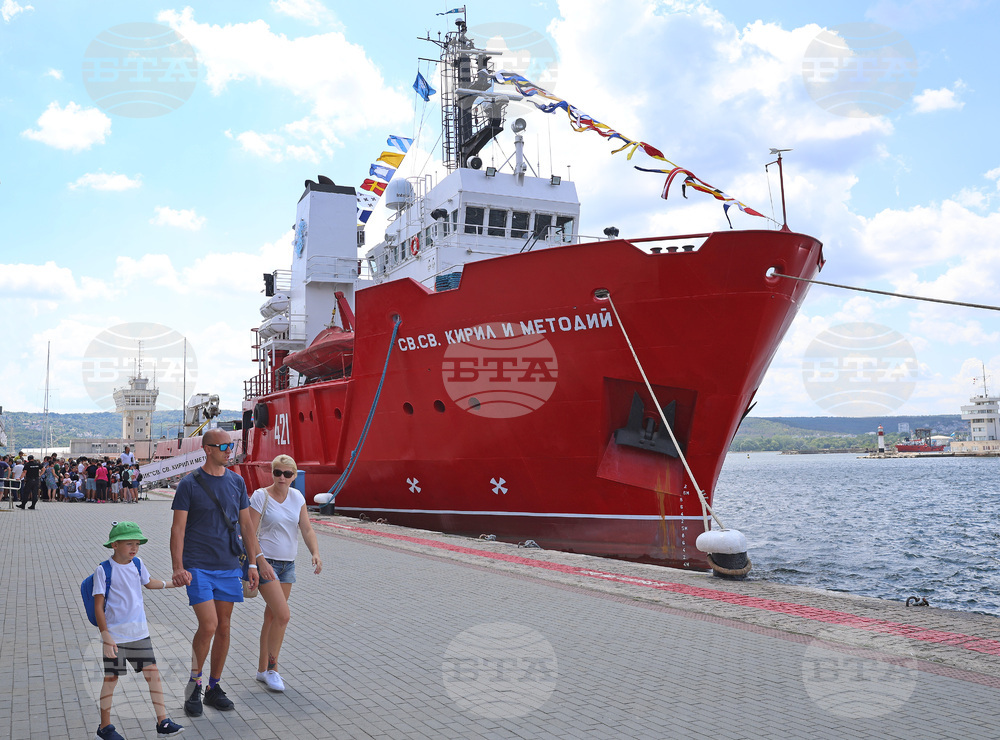site.btaNaval Research Vessel RSV 421 Sets Sail for Antarctica


The research ship Sv. Sv. Kiril i Metodii (RSV 421) of the Bulgarian Navy set sail for Antarctica on Thursday, November 7, starting its third voyage in support of the annual Bulgarian expedition to the icy continent. The send-off ceremony at the Passenger Terminal of the Port of Varna started at 12 noon Bulgarian time, the Nikola Vaptsarov Naval Academy said. This will be the 33rd Bulgarian Antarctic Expedition.
An EnduroSat laboratory was inaugurated on board RSV 421 before the beginning of the voyage. The facility will receive, process and analyze data from space-based systems for observation of the land and ocean surface. It will also monitor ship traffic, ice floe, pollution and the hydrometeorological situation.
The ship’s 34-member crew includes three women, said Commanding Officer Radko Muevski.
Among the guests at the send-off were Varna Regional Governor Andriana Andreeva, Mayor Blagomir Kotsev, the President of the World Meteorological Organization, Abdullah Al Mandous, the Chairman of the Board of the Bulgarian Antarctic Institute (BAI), Prof. Christo Pimpirev, officers, relatives of the crew and local people. Congratulatory addresses were read on behalf of President Rumen Radev and Defence Minister Atanas Zapryanov. The Chief of the Naval School in Varna, Flotilla Admiral Kalin Kalinov, stressed that RSV 421 is "an example of a unique union of the efforts of the State, the academic and maritime spirit and the business".
The vessel is expected to drop anchor off the Bulgarian Antarctic Base on Livingston Island in 50-53 days’ time. It will stay in Antarctica for about 45 days.
As before, a group of trainee cadets will be on board RSV 421, Naval Academy Rector Ft. Adm. Kalin Kalinov told BTA. Twenty of them, including two Romanians, will travel to Cartagena, Spain, from where they will return to Varna. Another four youths will stay aboard RSV 421 throughout the whole voyage.
The EnduroSat lab
The space laboratory on board RSV 421 is the work of EnduroSat. The company's founder, Raicho Raychev, pointed out that it was a way to experiment on space-sea synergy. Thanks to the lab, the crew will receive images from the company's satellites. The lab will also be synchronized with the state-of-the-art Balkan-1 satellite, which is expected to be launched into orbit around February next year.
In Raychev's words, the Bulgarian Antarctic expedition will have one of the most advanced systems for Earth observation from space during its next mission. The crew will be able to have pictures from space of their route throughout the voyage.
The laboratory will also use data from a multispectral camera, with 7 channels of the light spectrum, Raichev further explained. According to him, this will make it possible to study the state of the ice, as well as its chemical composition. When the ship docks, the entire area around the base can be surveyed, Raichev said.
"With the construction of the lab, we also have ideas for the training of cadets to use space data and technology," said the EnduroSat CEO. He recalled that the company has partnered with two military schools and Sofia University, where master's programmes in space technology have been opened. "We have already enrolled eight young people in the program, which started at the Naval University. Another four are enrolled at the Air Force School and nearly 10 at the Sofia University. We never wanted the number of people in the programs to be large, but rather for those who enroll to gain a lot of new knowledge and skills," Raichev said, stressing that the new laboratory on board the ship will be a springboard for their future realization. He also added that equipping the lab on board NIC 421 is a small part of a much larger initiative that will be developed in the future.
/VE/
Additional
news.modal.image.header
news.modal.image.text
news.modal.download.header
news.modal.download.text
news.modal.header
news.modal.text

















